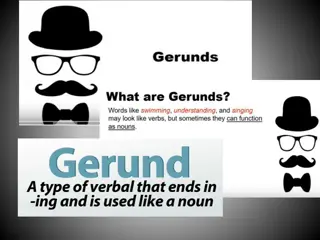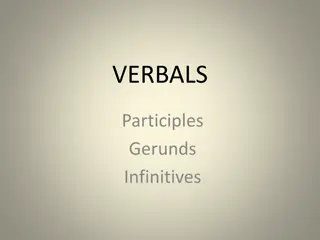Verbals
Verbals are formed from verbs but serve different functions. There are three kinds of verbals: participles acting as adjectives, gerunds ending in -ing and acting as nouns, and infinitives functioning as nouns, adjectives, or adverbs. Infinitives are formed with the word "to" followed by a verb stem and can act in various ways. Split infinitives should be avoided, and gerunds behave as nouns ending in -ing. Examples and nuances of usage are provided.
Download Presentation

Please find below an Image/Link to download the presentation.
The content on the website is provided AS IS for your information and personal use only. It may not be sold, licensed, or shared on other websites without obtaining consent from the author.If you encounter any issues during the download, it is possible that the publisher has removed the file from their server.
You are allowed to download the files provided on this website for personal or commercial use, subject to the condition that they are used lawfully. All files are the property of their respective owners.
The content on the website is provided AS IS for your information and personal use only. It may not be sold, licensed, or shared on other websites without obtaining consent from the author.
E N D
Presentation Transcript
verbals Verbals and verbal phrases are formed from words we recognize as verbs, but that are serving some other function.
There are three kinds of verbals: Participle verbal acting as adj. Gerund verbal ending with the -ing suffix, acting as noun Infinitive
Infinitives An infinitive is a verbal consisting of the word to followed by a verb in its simplest "stem" form, and functioning as a noun, adjective, or adverb: To ask To try To graduate To celebrate
Infinitives Note that to is also used as a preposition. Pay close attention to the word following to : if it is followed by an action word, you likely have an infinitive; if it is followed by a noun or an adjective, you probably have a prepositional phrase.
Infinitives He needed to ask a question. ask = action (verb) to ask = infinitive The students went to McDonald s for lunch. McDonald s = noun to McDonald s = prep. phrase They went to the newest French restaurant. the = adjective to the newest French restaurant = prep. phrase
Split infinitives Avoid splitting the parts of the infinitive ( to + verb stem) with adverbs: Bad: He had to quickly decide before acting. Better: He had to decide quickly before acting.
Gerunds The gerund is a verb form used as a noun, and ends in ing. Since gerunds act as nouns, they may be used in one of the following ways: subject, direct object, indirect object, object of the preposition, or predicate nominative.
Gerunds Example: Running is good exercise. In the example above, note that the word running is the subject of the sentence, and any word acting as the subject must be a noun, or a word acting as a noun. We normally think of running as action, but in this case, the word is not used to describe what some subject is doing.
Gerund phrases: Gerund phrases are phrases comprised of a gerund and its modifiers. Running in place is good exercise. His daily running was a routine he made sure never to miss.
Gerunds Running is good exercise. (noun) We were running in the race. (verb) He put on his running shoes before heading out. (adjective)
5 ways nouns are used: Running is good exercise. (subject) He enjoys reading in his spare time. (d.o.) He gave running on his bad ankle a try, but it was too painful. (i.o.) He always talks about fishing. (o.p.) One thing he has always enjoyed is cooking, and the fancier the meal the better. (p.n.)
Participles Participles are verb forms (words we recognize as verbs, or action words) which are behaving as adjectives. As such, they are NOT verbs. Present participles end in ing Past participles end in d or ed, or may take an irregular form ( broken, for example)
Participles I wore my running shoes for the race. Verb: He is running for president. The finished product looked very professional. Verb: We finished the book yesterday. The forest was filled with animals and fallen trees. Verb: The tree had fallen across the street.
Participial phrases: participial phrases are phrases comprised of a participle and its modifiers. As such, these phrases act as adjective phrases. [Finished] with his homework, he turned on the television. The candidate, [running] for mayor, gave speeches all over the city.





